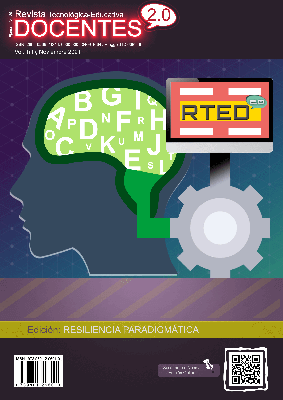Potenciar la Competencia Argumentativa en Ciencias Naturales Mediante una Estrategia Pedagógica
 DOI:
https://doi.org/10.37843/rted.v1i1.236
DOI:
https://doi.org/10.37843/rted.v1i1.236
Contenido principal del artículo
Resumen
Las competencias argumentativas forman parte de las competencias consideradas como relevantes en educación. Dentro de las ocho competencias básicas propuestas por la Comisión Europea se contempla la de aprender a aprender, es decir, que los estudiantes sean conscientes de cómo se aprende y de cómo aprender. El objetivo principal de esta investigación fue evidenciar la competencia argumentativa de estudiantes de grado séptimo en el área de ciencias naturales, mediante una estrategia pedagógica diseñada como herramienta en Moodle en una institución de Bogotá (Colombia). El enfoque que se utilizó es mixto (cuantitativo-cualitativo). La muestra de estudio es intencional, con 25 participantes, entre los 12 y 13 años de ambos géneros, masculino y femenino con estrato socioeconómico heterogéneo 2 y 3. El instrumento que se utilizó fue una encuesta como herramienta de recolección de datos, donde se permitió reconocer algunas competencias en los estudiantes en relación con las habilidades, conocimientos y actitudes hacia el área de ciencias naturales. La investigación permitió concluir que los estudiantes reconocieron la importancia de trabajar con las Tecnologías de la Información y la Comunicación (TIC), pues les permite ser más autónomos en su quehacer en la escuela, manteniéndolos más activos en el proceso de argumentación en ciencias naturales, identificando el apoyarse en tecnología para potenciar aquellas competencias en las cuales tienen algún grado de dificultad para ellos.
Descargas
Métricas
Detalles del artículo

Esta obra está bajo una licencia internacional Creative Commons Atribución-NoComercial-SinDerivadas 4.0.
Aquellos autores que tengan publicaciones en nuestra revista aceptan los términos siguientes:
- En el momento en que una obra es aceptada para su publicación, el autor conserva los derechos de reproducción, distribución de su artículo para su explotación en todos los países del mundo en el formato proporcionado por nuestra revista, así como en cualquier otro soporte magnético, óptico y digital.
- Los autores conservarán sus derechos de autor y garantizarán a la revista el derecho de primera publicación de su obra, el cual estará simultáneamente sujeto a la Licencia de reconocimiento de Creative Commons (Attribution-NonCommercial-NoDerivatives 4.0 International (CC BY-NC-ND 4.0)) que permite a terceros copiar y redistribuir el material en cualquier medio o formato, Bajo las condiciones siguientes: Reconocimiento — Debe reconocer adecuadamente la autoría, proporcionar un enlace a la licencia e indicar si se han realizado cambios. Puede hacerlo de cualquier manera razonable, pero no de una manera que sugiera que tiene el apoyo del licenciador o lo recibe por el uso que hace. NoComercial — No puede utilizar el material para una finalidad comercial. SinObraDerivada — Si remezcla, transforma o crea a partir del material, no puede difundir el material modificado. No hay restricciones adicionales — No puede aplicar términos legales o medidas tecnológicas que legalmente restrinjan realizar aquello que la licencia permite.
- Los autores podrán adoptar otros acuerdos de licencia no exclusiva de distribución de la versión de la obra publicada (p. ej.: depositarla en un archivo telemático institucional o publicarla en un volumen monográfico) siempre que se indique la publicación inicial en esta revista.
- Se permite y recomienda a los autores difundir su obra a través de Internet (p. ej.: en archivos telemáticos institucionales, repositorios, bibliotecas, o en su página web), lo cual puede producir intercambios interesantes y aumentar las citas de la obra publicada.
- El retiro de un artículo se solicitará por escrito al Editor, haciéndose efectivo luego de respuesta escrita de este. Para tal efecto, el o los autores enviarán correspondencia vía E-mail: [email protected].
- El autor no recibirá compensación económica por la publicación de su trabajo.
- Todas las publicaciones de la Revista Docentes 2.0, están bajo la plataforma Open Journal System (OJS) en dirección: https://ojs.docentes20.com/
Citas
Cedillo, Y., Macías, R., & Segura, F. (2012). La evaluación de la competencia argumentativa. Obtenido de http://www.redalyc.org/pdf/1794/179426856003.pdf
Chincilla, N. (2016). Normas de n-etiqueta. Obtenido de https://rua.ua.es/dspace/bitstream/10045/79601/2/CI2_intermedio_2017-18_Netiqueta.pdf
Fernández Collado, C., Baptista Lucio, P., & Hernández Sampieri, R. (2014). Metodología de la Investigación. Editorial McGraw Hill.
Florez, M. (11 de diciembre de 2015). Las habilidades de la indagaciòn científica y las estrategias de aprendizaje de las ciencias. Obtenido de Repositorio Upch: http://repositorio.upch.edu.pe/bitstream/handle/upch/113/Las.habilidades.de.indagación.científica.y.las.estrategias.de.aprendizaje.en.estudiantes.de.quinto.de.secundaria.de.la.I.E..Mariano.Melgar.Distrito.Breña.Lima.pdf?sequence=3&isAllowed=y
Hayman, J. (1991). Proyecto de investigación: introducción a la metodología científica. Obtenido de https://www.researchgate.net/publication/27298565_El_Proyecto_de_la_Investigacion_Introduccion_a_la_Metodologia_Cientifica
ICFES, .. (2014). Alineación presentación prueba SABER. Obtenido de http://www.icfes.gov.co/documents/20143/177687/Guia%20lineamientos%20generales%20Saber%2011%202014-2.pdf
Ministerio de Educación Nacional, d. (1998). Ley general de educación 115. Bogotá: Ministerio de educación de Colombia.
Ruiz, F. (9 de septiembre de 2012). Caracterizaciòn y evoluciòn de los modelos de enseñanza de la argumentaciòn en ciencias naturales en bàsica primaria. Obtenido de tdx.cat: https://www.tdx.cat/bitstream/handle/10803/98466/fjro1de1.pdf;jsessionid=5FD485B214CF69CA37C80FFB35BF3E3A?sequence=1.
Spencer y Spencer. (1993). Las competencias . Obtenido de https://www.redalyc.org/pdf/706/70601006.pdf
Tobón, S. (2010). Secuencias didácticas: aprendizaje y evaluación de competencias. México: Pearson educación.






